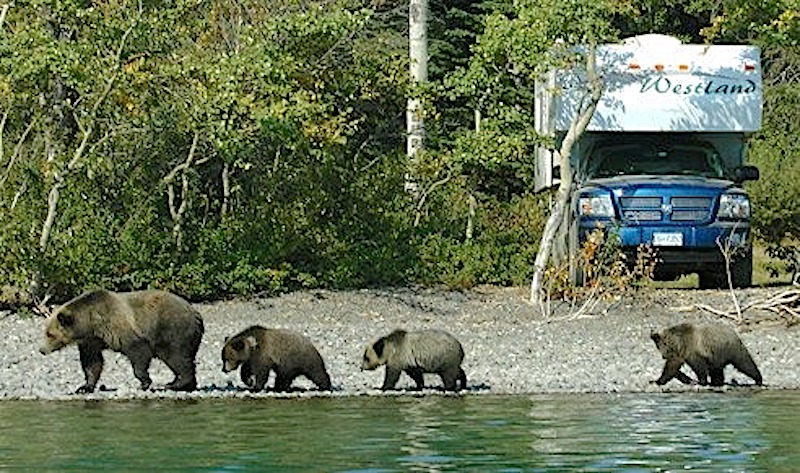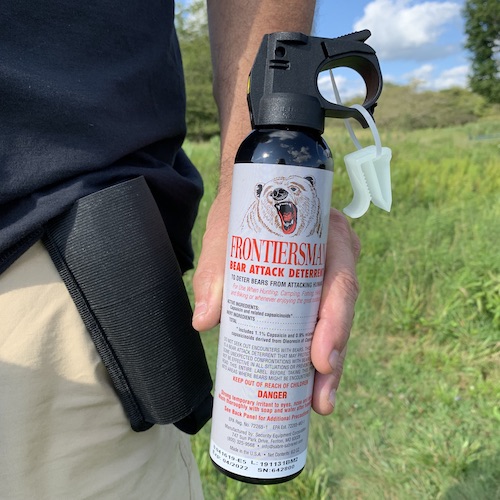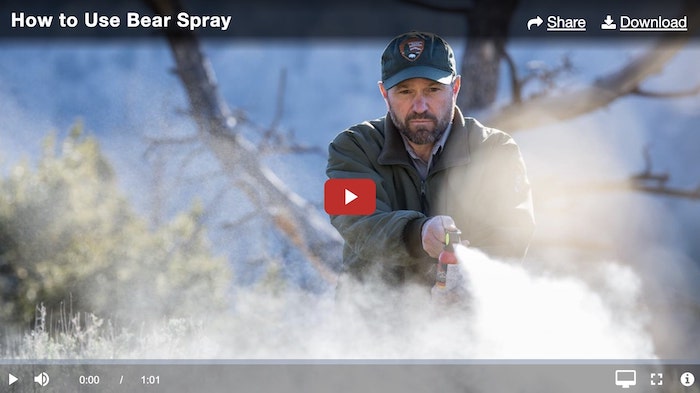Thanks for your support! If you make a purchase using our links in this article, we may make a commission. And, as an Amazon Associate, I earn from qualifying purchases. See the full disclosure here.
When you make the decision to purchase an RV or travel trailer you are making a big decision. For most people it is a significant financial investment. As a result, it can be quite scary to purchase an RV as you do not know whether or not it is worth it. While that might be scary in the abstract, there are other things that might be crossing your mind that scare you physically. For example, you might be scared that a bear could get into your camper. After all, you will be spending a lot of time in the woods and there is a good chance you will see a bear a few times. Luckily, there are things you can do to bear proof your camper.
Many people have a fear of bears which is understandable. They are big, strong, and if they get upset, they could do some serious damage. However, it is extremely rare for people to get attacked by bears, so there is a very low chance that you will have a deadly encounter with one. That being said, it would not hurt to take some precautions to ensure that you and your family are safe on your next trip.
If you have a fear of bears you will be glad to hear that there are things you can do to bear proof your camper. If these things did not exist there would be a lot of people who would not go camping in areas with bears. Luckily, that is not the world we are living in, so you can prepare for any possible dangers by taking steps to bear proof your camper.
Can Bears Break Into RVs?
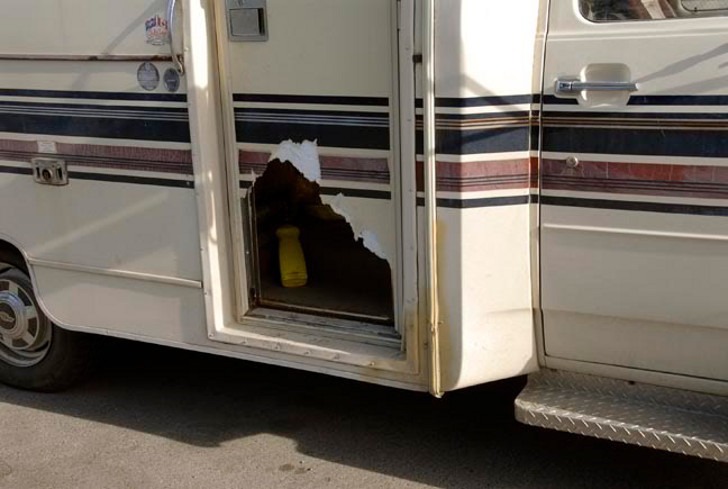
Before you take the time to bear proof your camper, we should talk about whether it is possible for bears to break into RVs. Unfortunately, it is possible for a bear to break into your RV. You see, bears are attracted to anything that has food, or anything that is scented. As a result, there is a decent chance that if you do enough camping a bear will smell the food in your RV at least once.
Additionally, bears are very intelligent creatures, which can be problematic. When you first pictured a bear breaking into an RV, you probably thought of a violent situation where the bear broke the door or window. While the bear certainly will not be gentle, they can also be intelligent enough to pick locks.
As it turns out, bears do not care if you are staying in an RV or a tent, they will try to break into your living area if they smell food. Leaving cooked food out is the most common cause of bears to pickup on the scent of someone’s campsite.
However, there are other things that attract bears as well like the smell of scented toiletries. You might not think that bears would be attracted to that kind of scent, but it will attract them all the same.
So, you need to be careful about leaving food out, and you need to be careful about bringing scented things on your camping trips altogether.
How Do I Keep Bears Out of My RV?
So, you have taken the time to purchase your RV and you are ready to head out to a campsite. However, your fear of bears has left you paralyzed and not ready to commit to a trip. Fortunately, there are things you can do to ensure that bears do not get into your RV.
Firstly, most campsites that are known to be in bear country have food lockers. Food lockers are large metal containers that are bear proof. You can store two large coolers in there. This way if a bear wonders onto the campsite after smelling food it will not go straight to your RV. Instead, it will go to the food lockers where it will be unable to break in.
Furthermore, you should make sure that your RV is completely void of food products other than in a fridge. Make sure that you clean thoroughly after you eat a meal because bears can smell even the smallest food particles. Even if you just have some crumbs that have fallen on the floor, they may pick up that scent.
Additionally, you should make sure that you do not store garbage in your RV. Garbage obviously carries a strong scent, and bears will certainly pick up on it. You can also store your garbage bags in the food lockers overnight if you do not have time to get to the bear proof dumpsters before nightfall.
Some people also like to take candles with them to light up the area outside their RV if they are hanging out outside at night. However, you need to make sure you bring them into your RV at night so that bears cannot smell them. It is even better if you purchase unscented candles instead.
Are Pop Up Campers Safe from Bears?
Pop up campers are not necessarily the best option if you are staying in an area that is known to have bears. While they are certainly better protection that a tent, they do not protect as well as a regular RV does. The walls of the pop up camper are not as strong as the walls of a typical RV. This is because the pop up camper obviously needs to fold up and it is quite smaller. So, it does not offer as much protection.
With all that being said, you might think that you are in danger if you go camping in a pop up camper. That is not true as you can certainly go camping with a pop up camper. However, it is still a good idea to take some extra precautions when you camp in one as opposed to an RV.
You should be extra thorough in cleaning your pop up camper. Take the extra time to ensure that there are no crumbs lying around on the floor of your camper. Otherwise you could be in for a very bad time.
Do Car Alarms Scare Bears?
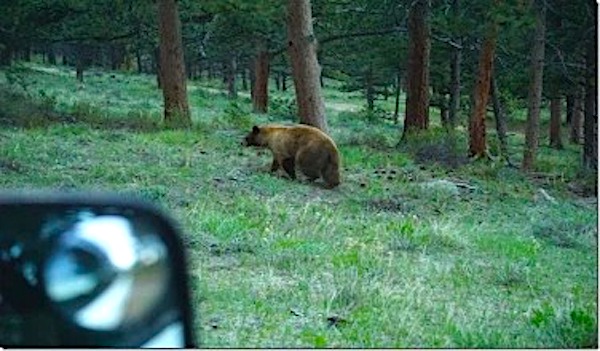
You might think that you can scare off a bear by producing loud repetitive sounds like a car alarm. While this might work in some situations, it will not always be effective. It is possible that a bear will be startled or scared off by flashing lights, noise makers, alarms, or sprinkler systems the first time they encounter them. However, after the first time it will lose effectiveness.
As we mentioned above, bears are intelligent creatures and they will not be fooled by a loud noise more than once. Studies have shown that unless something happens to reinforce an alarm as a negative experience, the bar will not be deterred the next time it hears it. They will quickly learn that these alarms are not a danger to them at all, and they will ignore them completely. That being said, the commotion will at least notify you and the other campers that something has entered the campsite.
Alarms are especially ineffective at campsites because of how often the bears in those areas interact with humans and human objects. Chances are the bear you see on your campsite has wandered onto the campsite many times. As a result, there is a very good chance that they have heard a car alarm before and know that it is not harmful. So, if you are planning on using your car alarm as a deterrent, you should know that it will not be very effective in most situations.
Is an RV Refrigerator Bear Proof?
So, you might think that if you put food in your refrigerator there is another barrier between the bear and the food. As a result, you might think that the bear could no longer detect that scent. Unfortunately, that is not always the case. While it is true that adding another barrier between the bear and your food will reduce the scent of the food, it will not eliminate it. As a result, there is still a chance that the bear could smell it because RV refrigerators are not bear proof.
As a result, it is a better idea to store your food in a food locker as we discussed above. Alternatively, you could purchase a bear box which does a pretty good job of eliminating the scent of food.
However, it is probably a better idea to play it safe and keep your food outside your RV. It is better to avoid risk altogether, and if you have access to an RV food locker there is no reason not to use it. So, use it and you can rest easy knowing that no bears will be getting into your RV any time soon.
Should I Keep Bear Spray on Board My RV?
If you were not aware, bear spray is a type of aerosol that acts as a deterrent for bears. It has ingredients that will make bears run away and flee. As a result, it is a good idea to keep bear spray onboard your RV, on your belt loop at your campsite, or when hiking in bear country.
You never know when you are going to have an encounter with a bear. As a result, it is better to be safe than sorry which is why we always bring bear spray with us on our camping trips. We keep it on hand in our RV so that we can use it any time if need be.
Additionally, we even bring bear spray with us on our hikes. There is always the worry that you will encounter a bear at the campsite, but at least you have the protection of your RV at the campground. However, many people do not think of the possibility of a bear encounter when hiking. Despite that, you are in more danger on a hike than in the campground because you have no immediate protection. With that in mind, we always bring bear spray with us wherever we go when camping because we want to be prepared for an emergency.
NOTE: If you are inside your camper and a bear is outside you should not try to spray the bear from inside your camper or you will be breathing in the bear spray! Instead keep an air horn on board and use that to scare any bears away.
Below is a video that was made by the National Park service on how to use bear spray.
4 Tips to Keep Bears Away from Your RV
When you are at the campsite there are a few things you can do to help keep bears away from your RV. It is good to be prepared for if a bear comes into a campsite and starts looking around your RV, but it is better to avoid that situation altogether if you can. So, here are a few tips on how to bear proof your camper and keep them away.
1. Keep a Tidy Campsite
The first and most important thing to do is something we have discussed a bit already. You should make sure that your campsite is very clean. Don’t leave trash, coolers or anything else outside your vehicle that might look like it contains food. Anything that looks like a food container could attract a bear.
Additionally, you should make sure that you bring everything into your trailer at night. That even includes citronella candles. Bears find scented things like those candles delicious and will come to your RV if you leave them out.
2. Remember You are in Bear Territory
Before you head out on a trip, make sure you know whether you are staying bear territory. If you are, do not go looking for bears to post on your social media. This may seem obvious to most of you, but you would be surprised how many people put themselves in harms way for a couple of likes on Instagram. If you see a bear naturally, do not draw attention to yourself or encourage an interaction.
3. Stand Your Ground
You might have heard this before in movies or TV shows, but if you ever come face to face with a bear do not run. Under no circumstances should you turn your back to the bear. Instead, you need to stand tall and stare the bear down. You can even wave your arms back and forth above your head and speak in a load and low voice. You can back away slowly and diagonally, but if the bear starts to follow, stop and stand your ground.
Additionally, you should also know that a bear might charge at you, but almost all charges are bluff charges. As crazy and terrifying as it might sound, do not run when the bear charges at you. Wave your arms and yell at it in a low voice. Most charges are bluffs and the bear will veer off to the side. A lot of the time the bear will come within a few feet of the person before veering of to the side, so you need to be brave.
If the bear comes into your campground, chase it away aggressively. Bang pots and pans together and throw rocks at it. If you need to you can even hit the bear. Do everything you can to keep it form getting food.
4. Educate Yourself on How to Handle a Bear Encounter
Many people think that it is a good idea to carry a weapon when traveling in bear country in case of emergencies. However, there is a far greater chance that you will shoot yourself or someone else than a bear, so this is not advised. Instead, it is better to educate yourself on safety measures and the signs of a bear attack.
Firstly, bears tend to hide in thick and dense brushes. So, be careful when you are camping in secluded areas. Additionally, you should avoid hiking alone. Strength in numbers is a real thing and bears will be more hesitant to attack if you outnumber it.
Finally, you should be aware of when a bear is actually planning an attack. An agitated bear will lay its ear back and start to make loud huffing noises. It will pop its jaws and start to paw the ground with its front claws. It will then start to swing its head from side to side and it might do a bluff charge. If you notice any of these signs you need to be extra careful. Use the methods of deterrence that we discussed above, and you will give yourself the best chance to avoid a deadly encounter.
What Should You Do if You are Attacked by a Bear?
Bear attacks are extremely rare if you educate yourself on how to behave when bears are nearby. However, if you are attacked by a bear your reaction will depend on the type of bear you have encountered according to the National Park Service in their article called Staying Safe Around Bears.
Bear attacks are rare; most bears are only interested in protecting food, cubs, or their space. However, being mentally prepared can help you have the most effective reaction. Every situation is different, but below are guidelines on how brown bear attacks can differ from black bear attacks. Help protect others by reporting all bear incidents to a park ranger immediately. Above all, keep your distance from bears!
Brown/Grizzly Bears: If you are attacked by a brown/grizzly bear, leave your pack on and PLAY DEAD. Lay flat on your stomach with your hands clasped behind your neck. Spread your legs to make it harder for the bear to turn you over. Remain still until the bear leaves the area. Fighting back usually increases the intensity of such attacks. However, if the attack persists, fight back vigorously. Use whatever you have at hand to hit the bear in the face.
Black Bears: If you are attacked by a black bear, DO NOT PLAY DEAD. Try to escape to a secure place such as a car or building. If escape is not possible, try to fight back using any object available. Concentrate your kicks and blows on the bear’s face and muzzle.
If any bear attacks you in your tent, or stalks you and then attacks, do NOT play dead—fight back! This kind of attack is very rare, but can be serious because it often means the bear is looking for food and sees you as prey.
Stay Safe by Making Sure That You Bear Proof You Camper
After reading, we hope you have all the information on how to bear proof your camper. We know there is a lot of information to absorb, but it is better to have more information than too little in a situation like this. The last thing you want is to have an encounter with a bear and not know what to do. Most people that die from bear attacks ran away when they saw the bear and were chased down. If you do not run away, there is a good chance the bear will not attack.
Camping in an RV means that you will likely have an encounter with a bear at some point. Whether this will just be a bear wandering onto the campsite or you have a direct encounter is unknown, but you should know what to do in both situations. So, take the time to do your research and you will be ok.
Camping in a new RV is very exciting, but that joy will be cut short if a bear starts to bang on your RV. So, take the time to bear proof you camper and make sure you are safe. Once this is done you will be able to camp in peace.
Are you going to bear proof your camper? Where are you traveling that makes you want to bear proof your camper? Have you ever had an encounter with a bear? Let us know in the comments!

